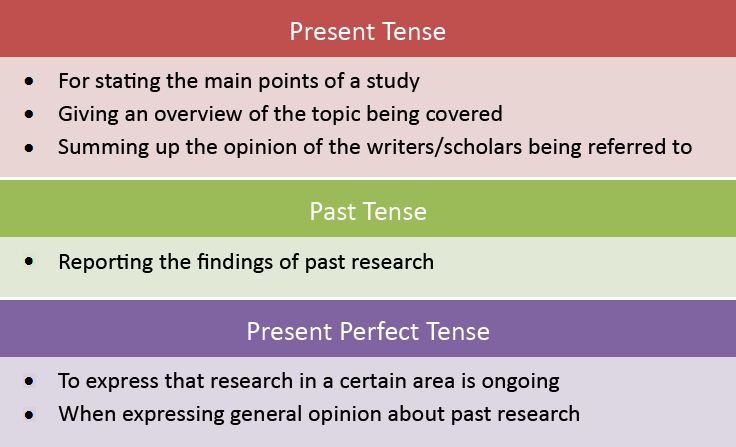How to Use Tenses in Academic Writing Effectively

Verb tenses alert readers when a certain event or action takes place. However, in academic writing, tense usage goes beyond the simple representation of chronology. Tense choice also indicates the degree of generality intended and discloses an author’s attitude towards the idea/theory that is being reported.
To gain insight into tense usage in academic writing, a typical academic paper can be divided into its most common framework and grammar usage can be molded according to the typical framework used in the particular subject area. This article will primarily explore and expand on the general usage of tenses in quantitative and scientific studies.
Introduction
The introduction expresses background information, which is generally accepted as facts in a particular subject area. The relevance of the study also needs to be stated; along with this, a brief outline of the author’s opinion is also expressed. This section is generally written in the present tense considering its contents—presentation of accepted facts and current opinion of the facts and theories being reported.
Methods Section
The Methods section describes the processes that were followed to arrive at a certain conclusion. Considering these processes generally take place before the arrival at a conclusion, the Methods are usually written in the simple past tense. Additionally, the passive voice is abundantly used in this section.
Discussion & Conclusion Sections
Authors may use a carefully selected (and contextually relevant) combination of present and past tense in this section. For instance, the outcomes and processes can be summarized in the past tense while the implications and future relevance can be described in the present tense. The Conclusion section can also be constructed in a similar manner considering the contextual relevance of the facts and implications being considered (for example, the past tense can be used to refer to a theory or fact that has been sufficiently refuted in a field).
The following table can be used as a simple reference.
 Source: https://www.usq.edu.au/academic-success-planner/verbs/verb-tenses/step1
Source: https://www.usq.edu.au/academic-success-planner/verbs/verb-tenses/step1
As there are no definite rules of tense usage when writing literature reviews, either the past or the present tense can be used (for example, it may seem prudent to discuss the literature in line with contemporary arguments rather than as accepted facts). However, it is important to ensure that the tense usage is consistent so as not to confuse readers.
Tense usage in the humanities varies greatly from its usage in scientific papers. For example, the most notable illustration in Literature documents, which embodies the idea of a “literary present” when elaborating on a work of fiction—that is the world of fiction and the authorial intent exists in a timeless world that is best represented in the present tense. However, qualitative studies in the field of humanities still adhere to the general framework described in this article.
References:
Academic Skills, University of Melbourne. Using Tenses in Scientific Writing. Retrieved from http://services.unimelb.edu.au/__data/assets/pdf_file/0009/471294/Using_tenses_in_scientific_writing_Update_051112.pdf
Academic Coaching & Writing. Guide to the Use of Verb Tense in the Humanities. Retrieved from http://www.academiccoachingandwriting.org/assets/uploads/ACW%20Verb%20Tenses%20in%20the%20Humanities.pdf
Academic Success Planner, University of Southern Queensland. Verb Tenses in Academic Writing. Retrieved from https://www.usq.edu.au/academic-success-planner/verbs/verb-tenses/step1




